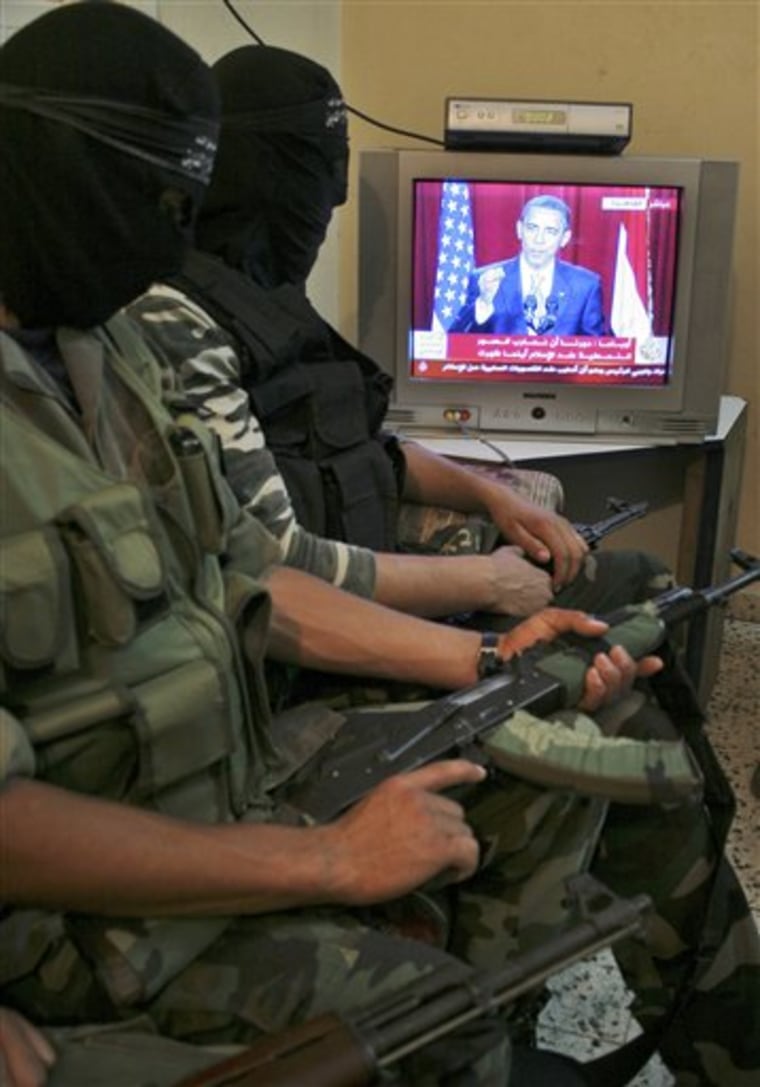The tone of respect was set from the opening lines of President Barack Obama's address to the Muslim world.
"Assalamu Aleikum" — Arabic for "peace be upon you" — he said, triggering applause from the crowd at Cairo University and bringing nods of approval in places like a coffee shop in the West Bank town of Ramallah, where some began calling him "Abu Hussein" — using his Muslim middle name — as a sign of honor.
Obama's ambitious speech — which sought to define a new relationship between Washington and the Islamic world — also represented an opportunity to shape his own image in the eyes of Muslims. He quoted from the Quran, paid homage to the cultural and intellectual achievements of Muslims and noted his middle name and his father's ties to the faith.
"As the Holy Quran tells us, 'Be conscious of God and speak always the truth,'" Obama said. "That is what I will try to do today, to speak the truth as best I can."
'Sincere and credible'
Whether political stagecraft or sincerity, his gestures resonated strongly among many Muslims who often complain their traditions and culture are devalued in the West and have become overshadowed by Islamic radicals.
"He came across as sincere and credible," said Sheik Muhammad al-Nujaimi, a member of committee in Riyadh, Saudi Arabia, that tries to moderate the radical views of jailed militants. He said he plans to give a copy of Obama's address to the inmates with a message: "Muslims should offer help to the new American administration and reciprocate its overtures."
Obama also sprinkled his address with Arabic words that are well-known to all Muslims: "hijab" for the Islamic coverings for women, "zakat" for alms giving, which is one of the Five Pillars of Islam.
Even these few references carry powerful significance in the Arab world, where the language is cherished as an important ethnic bond, revered for its connection to the Prophet Muhammad, and filled with elaborate greetings and finely crafted formalities that display respect.
Ring of authenticity
Obama's closing line — "And may God's peace be upon you" — rings with authenticity and cultural sensitivity to Arabic ears.
It's not clear whether Obama's address will have a lasting glow. A Jordanian jeweler, Ibrahim Hreish, described its effect as a "drug" that will eventually wear off.
But there were obvious comparisons to Obama's predecessor, George W. Bush, whose use of language — such as calling for a "crusade" against terrorists after the Sept. 11 attacks, a term that brought to mind the Christian Crusades against Islam in the Holy Land — helped stir anti-American anger in the Muslim world.
Obama "was fair on basics, soft on tone," said Labib Kamhawi, a political analyst in Amman, Jordan. "He avoided using provocative terms of the previous administration like `war on terrorism.'"
Obama said he was "proud to carry with me the good will of the American people and a greeting of peace from Muslim communities in my country."
Respecting culture
Even some extremist Web sites, which have carried statements from al-Qaida and other groups in the past, added some rare hints of praise amid the scorn for Obama.
One posting on a chat room noted admiration for U.S. Secretary of State Hillary Rodham Clinton "wearing a head scarf ... and she and Obama taking off their shoes" during a visit to a Cairo mosque. The contributor also praised Obama's quotation of verses from the Quran, "while many of our leaders don't memorize these verses."
In response, another writer said Obama "is manipulating the emotions of the people the same as a lute player does. ... He is undoubtedly a wise enemy compared with George Bush, the enemy known for his stupidity."
In his speech, Obama cited an account from the Quran in pleading for peace in Jerusalem among "all the children of Abraham" — Muslims, Christians and Jews. The president referred to a miracle called al-Isra, or the Night Journey, in which an angel took Muhammad to the heavens, where Muhammad prayed with Moses and Jesus.
In Kuala Lumpur, Malaysia, a 27-year-old computer engineer, Yasmine Bennami, said of the president's address: "It's the first time ever that I see an American president quoting verses from the Quran."
In Saudi Arabia — home of Islam's holiest sites — Rabah al-Mutawa said Obama, by quoting from the Quran, "touched people." "I challenge any Arab leader to go to the U.S. or the West and quote the Bible like Obama quoted the Quran," she said at her home in Riyadh.
Muhsin Karim, 45, an engineer at Iraq's Ministry of Electricity, said the speech was carefully crafted to reach Muslims: "As if he was trying to tell us, `Trust me, I'm like a cousin for you.'"
When Obama opened with his Arabic greeting, Mahmoud Ramahi smiled.
"This is good," said Ramahi, a lawmaker with the anti-Israel militant group Hamas in the West Bank. "This is the first good signal. We'll start counting."
